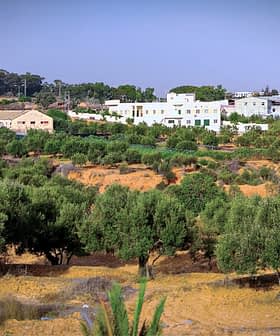Syria Restricts Olive Oil Exports as Harvest Outlook Worsens
Olive oil production in Syria is expected to fall by 50 percent in the 2023/24 crop year. Authorities have banned exports to prevent price rises.
 Sacks of olives at a mill in the Afrin countryside in northwestern Syria (AP)
Sacks of olives at a mill in the Afrin countryside in northwestern Syria (AP)  5.8K reads
5.8K readsSyrian officials expect a sharp drop in olive oil production after a bumper crop last year, with the Ministry of Agriculture predicting a yield of 49,000 tons for the upcoming crop year. The decline is attributed to natural cycles of the olive tree, climate change impacts, and challenges like drought and flooding in northwest Syria, leading to an export ban and high retail prices that strain the economy and put olive oil out of reach for many families.
After a bumper crop last year, Syrian officials expect a sharp drop in olive oil production.
The Ministry of Agriculture confirmed that the approaching 2023/24 crop year will yield 49,000 tons of olive oil.
According to data from the International Olive Council (IOC), Syria produced 134,000 tons of olive oil in 2022/23 and an average of 131,000 tons per annum over the past five years.
See Also:2023 Harvest UpdatesAbeer Johar, the director of the olive office at the Ministry of Agriculture, attributed the production decline to many producers entering an ‘off-year’ in the natural alternate bearing cycle of the olive tree paired with the impacts of climate change.
A June 2023 report from the United Nations Population Fund cited drought and flooding in northwest Syria, where the vast majority of the country’s olive oil is produced, as two of the region’s most significant non-conflict-related challenges.
If the ministry’s production estimates come to fruition, Syrian olive oil production will barely cover internal consumption, which the IOC estimated to reach about 100,000 tons in the last two seasons.
As a result, Prime Minister Hussein Arnous announced a ban on olive oil exports, which took effect on September 1st. IOC data show that the country exported 15,000 tons in 2021/22 and 24,000 in 2022/23.
According to Johar, banning exports limits further price rises for domestic consumers.
Olive oil retail prices in Syria vary significantly depending on the region. According to Selina Wamucii, a platform that connects farmers with consumers, olive oil prices at retail in the country range from $8.87 (€8.26) to $24.75 (€23.05) per kilogram.
These relatively high prices put olive oil out of reach for many families. The country’s economy has faltered significantly due to internal conflict and other macroeconomic factors.
More than 12 years of civil war have destroyed large parts of Syria, especially the northwest of the country, resulting in the death of more than 300,000 civilians and the displacement of millions more.
Rising oil and grain prices and February’s historic earthquake have further complicated the macroeconomic situation.
Rampant inflation and other macroeconomic troubles also led to neighboring Turkey implementing a ban on bulk olive oil exports to keep prices down.
The move came despite poor harvests across the western Mediterranean, which increased demand for imports in Spain and Italy, paired with a record-high crop in Turkey.
Despite Syria’s export ban, olive oil trade was among the topics Syrian and Pakistani authorities discussed when they met in Damascus at the end of August.
An agreement between the two countries is in the works for importing and exporting food, olive oil included.
Official figures show that olive production benefits 20 percent of the Syrian population. Olive groves comprise 11.5 percent of the country’s farmland and deliver 28 percent of the overall fruit production in the country.
Share this article









